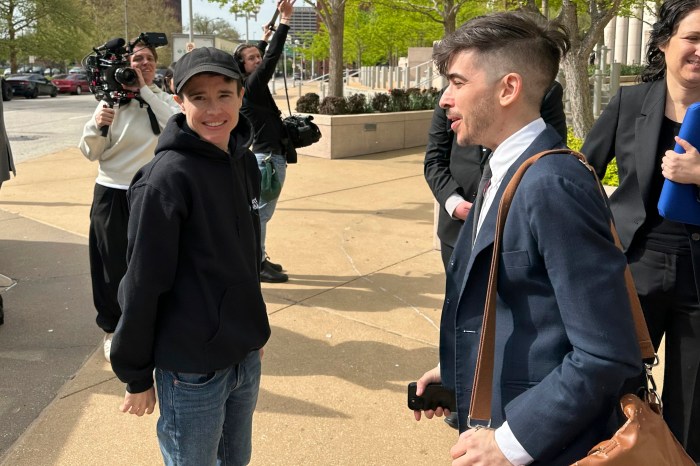Prop 8 trial recording may go public — but not on September 30
More than a year after now-retired federal District Judge Vaughn Walker ruled that California’s Proposition 8 violates the 14th Amendment of the US Constitution, Chief Judge James Ware, who assumed jurisdiction over the case, granted a motion by the plaintiffs to unseal the video recording of the trial.
“Foremost among the aspects of the federal judicial system that foster public confidence in the fairness and integrity of the process are public access to trials and public access to the record of judicial proceedings,” Ware wrote, in a September 19 ruling. “Consequently, once an item is placed in the record of judicial proceedings, there must be compelling reasons for keeping that item secret.”
Walker made the recording for his own use after the US Supreme Court ruled, on the eve of the trial, that it could not be broadcast live or recorded for delayed broadcast.
Ware’s ruling was based on a common law right of access to judicial proceedings. He rejected every argument made by Proposition 8’s Official Proponents, the only party to the case that opposed unsealing the recordings and making them public. The governor and attorney general of California have declined to defend the voter initiative.
Under Ware’s order, the recording was to become part of the open court record in the files of the US District Court in San Francisco on September 30, and would be accessible to members of the public and the media at that time. On September 27, however, a three-judge panel of the Ninth Circuit Court of Appeals issued a temporary stay to allow for consideration of the Proponents’ emergency motion for a longer stay pending an appeal of Ware’s ruling regarding the video’s release. This stay will take the issue at least several weeks beyond the original September 30 release date.
In December 2009, Walker received a request from a coalition of media companies for permission to televise the non-jury trial. At a January 6, 2010, hearing, Walker announced that an audio and video feed of the trial would be streamed live to several courthouses in major cities, and that the trial would be recorded for eventual broadcast on the Internet. The next day, Walker asked Ninth Circuit Chief Judge Alex Kozinski for permission to include this case in a pilot program established by the circuit for broadcast of non-jury trials, which was granted on January 8.
But the Official Proponents — who had been granted permission to participate in the trial as “defendant-intervenors,” since neither Governor Arnold Schwarzenegger nor Attorney General Jerry Brown would defend the measure on its merits — strenuously objected to broadcasting, arguing that this would deter their potential expert witnesses from participating in the case. They took their concerns directly to the US Supreme Court, seeking an emergency order to block the recording. The high court granted their application on January 13, 2010, holding that the Ninth Circuit and the District Court had failed to follow the necessary procedures for establishing the pilot program on broadcasting trials.
Walker, however, concluded that the Supreme Court’s order would not block him from having his own recording of the trial, and he notified the parties he would make one, to which none objected. Walker later offered to share the recording on a confidential basis with the attorneys on both sides as they prepared their final arguments, but the only ones who took him up on the offer were those for the plaintiffs challenging Proposition 8 and for the City of San Francisco, a co-plaintiff. The plaintiffs, represented by a top flight legal team assembled by the American Foundation for Equal Rights (AFER), played brief excerpts from the trial recording during their closing argument.
After his August 2010 ruling on the case, Walker ordered the clerk to deposit a copy of the recording in the trial record, under seal, so it would be available in the future in case there was need for the court to refer to it. When he retired early in 2011, Walker took a copy of the recording with him. When he subsequently played snippets from it to illustrate lectures he was giving at law schools, the Proponents went ballistic and sought a court order that all outstanding copies of the recording be returned to the court and kept under seal. The Ninth Circuit, where an appeal of Walker’s decision is pending, denied the Proponents’ motion that Walker be required to return his copy, but treated the plaintiffs’ opposition to that motion as a motion to release the recording, and sent it to Ware for consideration.
Another coalition of media companies joined in seeking a ruling from Ware to lift the confidentiality order Walker had placed on the recording, making it accessible.
Ware noted that the Ninth Circuit has yet to rule on whether the public has a First Amendment right to access to court files and records of trials — though some other circuit courts have ruled affirmatively on that question — but he found he did not have to take on the constitutional question because the issue could be decided on common law grounds. He cited a 1995 Ninth Circuit ruling recognizing a common law right of public access to records in civil proceedings.
Ware noted that the common law right of access places a burden on the party opposing access to provide compelling justification for doing so, because of the desire for “transparency” in the operations of the courts. Other courts have ruled that keeping court records secret should be done “only in the rarest of circumstances,” he wrote.
Ware rejected the argument that because Walker said at the trial’s outset he was making the recording for his own use, no other use should be allowed. He pointed out that Walker later allowed attorneys to use the recording, without any objection, and that there was “no authority in support of the proposition that the conditions under which one judge places a document under seal are binding on a different judge, if a motion is made to that different judge to examine whether sealing is justified.”
Ware also found nothing in the Supreme Court’s pre-trial order barring broadcast of the trial that would bear on his decision. The high court’s ruling found that the procedural niceties for amending the circuit’s rule on broadcasting had not been followed. It’s likely that the Supreme Court grabbed this procedural hook to avoid controversy on the question of the trial being broadcast.
Ware found the Proponents’ argument that the recording’s release would have a “chilling effect” on expert witnesses in future cases purely speculative, and thus no “compelling reason” to keep it under wraps. There is no issue about whether the Proponents’ two expert witnesses will be deterred, since their evidence is already on record and the trial is over, he wrote. The Ninth Circuit, meanwhile, has moved forward with its pilot program that allows civil non-jury trials to be broadcast.
In advance of the Ware hearing on the video, AFER and its legal team, led by Theodore Olson, David Boies, and Theodore Boutrous, threw the amendment’s defenders back on their heels by asking what they are trying to hide. A press release from AFER noted that the only two witnesses for Prop 8 in some instances made the case against the amendment, conceding that marriage equality benefits families and that Prop 8 was motivated by animus toward gay people — a constitutionally impermissible ground.
The issue now turns to the Ninth Circuit Court of Appeals. If that bench decides to hear an appeal of Ware’s ruling, release of the video will obviously be stayed for the duration since releasing it would be irrevocable. The plaintiffs have until October 3 to reply to the Proponents’ motion, and then seven days later the Proponents will give their reply. The world will know more about the chances any time soon of hearing and seeing what transpired in Judge Vaughn Walker’s courtroom at some point after October 10. — Additional reporting by Paul Schindler.

































